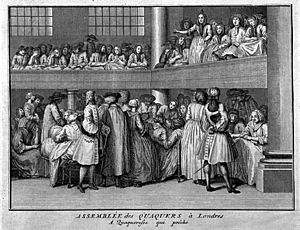Quaker views on women facts for kids
The Quakers, also known as the Religious Society of Friends, are a group of people who have always believed in treating everyone fairly. This idea, called progressivism, started in the 1600s. Because of these beliefs, Quaker women played a big part in the women's rights movement in America during the late 1800s. From the very beginning, Quakers gave women a more equal role than most other Christian groups at that time.
Contents
How Quakers Changed Women's Roles
For many years, people outside the Quaker community were surprised by one thing. Quaker women were allowed to speak during their worship meetings. This was called "ministry" and it started in the 1650s.
Early Women Leaders
One of the first people to explain why women should speak was Sarah Blackborow. Another important Quaker woman was Margaret Fell. She was known as the "Mother of Quakerism." Margaret Fell wrote a famous work called Womens Speaking Justified. In it, she argued strongly for women preachers. Her ideas were very complete for her time.
Many people were surprised to see women preaching. A famous writer, Samuel Johnson, once said it was like a dog walking on its back legs. He meant it was unusual, but impressive to see.
In the early days, many Quaker preachers who traveled were women. About one-third of all traveling Quaker ministers from America to England between 1685 and 1835 were women. Other groups at the time rarely allowed women to preach. Quakers were unique in their ideas about gender equality. Besides preaching, Quaker women traveled alone and published their own writings. This was also very unusual for the 1600s.
The Testimony of Equality
For Quakers, both in the past and today, including women in leadership is part of their "Testimony of Equality." This means they believe everyone is equal in the eyes of God. However, even with this belief, women's roles were not completely equal for a long time.
At first, men mostly led the Quaker business meetings. But within 25 years, the Quaker leader George Fox decided to create separate meetings just for women. This happened because he faced challenges to his leadership. One big change was that women's meetings had to approve marriages. This meant women had authority over men in some important decisions.
Having any authority, especially over men, was a very new idea in the 1600s. These separate women's meetings gave women valuable experience in leading groups. Even though these separate meetings ended later, they were very important. One historian said these meetings helped start modern feminism. They also helped movements like ending slavery, getting women the right to vote, and working for peace. Quaker women leaders were very important in all these efforts.
Quaker Women in the United States
Quakers were very active in the women's rights movement in the United States during the 1800s.
Key Figures in Women's Rights
Susan B. Anthony is a famous example. She was born into a Quaker family. She helped create the American Equal Rights Association. This group worked for equal rights for everyone.
A group called the Progressive Friends, who were radical Quakers, strongly supported women's empowerment. They formed just before the Seneca Falls Convention. This convention was a very important meeting for women's rights in 1848. The famous Declaration of Sentiments from this meeting was largely written by Quaker women. Many Quakers signed it, showing their strong support.
Lucretia Mott was a Quaker woman who helped write the Declaration of Sentiments. Quaker influence was also clear at the Rochester Women's Rights Convention in 1848. This meeting happened soon after the Seneca Falls Convention.
Fighting for Equality and Freedom
Quakers who worked to end slavery, known as abolitionists, also showed their belief in gender equality. They actively recruited both men and women to help with the Underground Railroad. This was a secret network that helped enslaved people escape to freedom.
Quakers continued to work for women's rights in the 1900s and 2000s. For example, Alice Paul was a Quaker woman. She was a major leader in the National Woman's Party. This party worked to pass the Equal Rights Amendment. This amendment aimed to guarantee equal legal rights for all American citizens regardless of sex.
 | Precious Adams |
 | Lauren Anderson |
 | Janet Collins |


